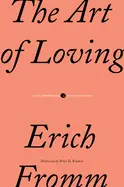
The Art of Loving - by Erich Fromm
ISBN: 0061129739Date read: 2022-07-05
How strongly I recommend it: 1/10
(See my list of 430+ books, for more.)
Go to the Amazon page for details and reviews.
Some good insights into respect and different kinds of love: brotherly, parental, romantic. But mixed in with hyperbole that made me quit reading.
my notes
In the Victorian age, love was supposed to develop once the marriage had been concluded.
Romantic love greatly enhanced the importance of the object as against the importance of the function.
People fall in love when they feel they have found the best object available on the market.
Being “crazy” about each other, proof of the intensity of their love, only proves the degree of their preceding loneliness.
The deepest need of man is the need to overcome his separateness, to leave the prison of his aloneness.
No man must be the means for the ends of another man.
Erotic love is based on the polarity of the sexes.
Virtue and power are one and the same.
Love is the active concern for the life and the growth of that which we love.
If someone says they love flowers, but they forget to water them, we would not believe in their “love” for flowers.
Responsibility is my response to the needs, expressed or unexpressed, of another human being.
The loving person feels responsible for his fellow men.
Respect comes from respicere = to look at.
Respect is the ability to see a person as he is, to be aware of his unique individuality.
Respect means the concern that the other person should grow and unfold as he is.
Respect implies the absence of exploitation.
Respect exists only on the basis of freedom.
Respect is not possible without knowing the person.
Care and responsibility would be blind if they were not guided by knowledge.
Knowledge would be empty if it were not motivated by concern.
The Don Juan needs to prove his male prowess in sex because he is unsure of his masculinity.
Father does not represent the natural world. He represents the world of thought, of man-made things, of law and order, of discipline, of travel and adventure.
Father is the one who teaches the child, who shows him the road into the world.
Father has the function of teaching, guiding to cope with problems.
Father’s love should be guided by principles and expectations; it should be patient and tolerant. It should give the growing child an increasing sense of competence and eventually permit him to become his own authority and to dispense with that of father.
The mature person becomes his own mother and his own father, with a motherly and a fatherly conscience.
Free from the outside mother and father figures, having built them up inside.
The mother must wish and support the child’s separation.
At this stage, motherly love is such a difficult task.
It requires unselfishness, the ability to give everything, and to want nothing but the happiness of the loved one.
To bear separation - and even after the separation to go on loving.
At this stage, many mothers fail in their task of motherly love.